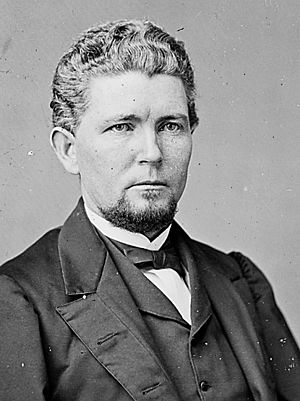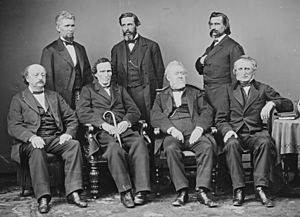James F. Wilson facts for kids
Quick facts for kids
James Falconer Wilson
|
|
|---|---|
 |
|
| United States Senator from Iowa |
|
| In office March 4, 1883 – March 3, 1895 |
|
| Preceded by | James W. McDill |
| Succeeded by | John H. Gear |
| Member of the U.S. House of Representatives from Iowa's 1st district |
|
| In office October 8, 1861 – March 3, 1869 |
|
| Preceded by | Samuel Ryan Curtis |
| Succeeded by | George W. McCrary |
| Member of the Iowa House of Representatives | |
| In office 1857 1859 |
|
| Member of the Iowa Senate | |
| In office 1859–1861 |
|
| Personal details | |
| Born | October 19, 1828 Newark, Ohio, U.S. |
| Died | April 22, 1895 (aged 66) Fairfield, Iowa, U.S. |
| Political party | Whig; Free Soil; Republican |
| Spouse | Mary A. K. Jewett Wilson |
| Profession | Politician, attorney |
| Signature | |
James Falconer "Jefferson Jim" Wilson (born October 19, 1828 – died April 22, 1895) was an American lawyer and politician. He was a member of the Republican Party. He served as a U.S. Congressman from Iowa's 1st congressional district during the American Civil War. Later, he became a U.S. Senator from Iowa for two terms. He was important in pushing for federal laws to protect civil rights.
During his time in the U.S. House of Representatives, he first opposed efforts to impeach President Andrew Johnson in 1867. However, he later voted to impeach Johnson in 1868. He then acted as a prosecutor in Johnson's impeachment trial.
In the late 1800s, two different men named James Wilson from Iowa became important politicians. To tell them apart, James F. Wilson (from Jefferson County, Iowa) was called "Jefferson Jim" Wilson. The other, James Wilson (from Tama County, Iowa), was known as "Tama Jim" Wilson.
Contents
Early Life and Political Beginnings
James F. Wilson was born in Newark, Ohio. His father passed away when James was eleven. This meant James had to start working at a young age. He went to school whenever he could.
He first worked as an apprentice making harnesses. Later, he studied law in Newark. He learned alongside William Burnham Woods, who would become a U.S. Supreme Court Justice. Wilson became a lawyer in 1851. He practiced law in Newark until 1853.
In 1853, he moved to Fairfield, Iowa. There, he continued his law practice. In 1856, he was chosen as a delegate. This was for a meeting to update Iowa's Constitution. The next year, he was elected to the Iowa House of Representatives. He worked on the Ways and Means Committee.
Early in his career, Wilson was against slavery. This led him to join the Free Soil Party. He played a key role in forming the Iowa Republican Party. He also helped shape Iowa's government before the Civil War. In 1857, he was part of Iowa's constitutional convention. He served as a Republican in the Iowa House of Representatives that year and again in 1859. In 1859, he was elected to the Iowa Senate. He worked on the Judiciary Committee. In 1860, he was a delegate to the Republican National Convention. This convention nominated Abraham Lincoln for president.
Serving in the U.S. House of Representatives
In 1860, James F. Wilson wanted to represent Iowa's 1st congressional district. The current representative, Samuel Ryan Curtis, won the nomination instead. After the Civil War began, Curtis resigned to join the Union Army. Wilson was then chosen to take his place. In October 1861, Wilson was elected to fill the empty seat. He easily won against his opponent.
After finishing Curtis's term, Wilson was re-elected three times. He served in Congress during the Civil War and the Reconstruction period. He was the chairman of the House Committee on the Judiciary. This was a very busy time for the country.
One of Wilson's first actions was to propose a rule. This rule stopped runaway slaves from being returned to the South. It also said that any military officer who ordered this would be fired. This rule became law. He also helped pass a law that gave voting rights to Black people in Washington, D.C.. Another bill he supported gave freedom to the families of Black soldiers.
As a business lawyer, Wilson believed in fair income tax rates for lower earners. He also supported "reasonable" levels of protectionism for American businesses. He backed grants for railroads and the Homestead Act. However, he did not support the Morrill College Land-Grant Act.
Wilson was part of a group called the "Radical Republicans." They strongly supported civil rights. He disagreed with President Andrew Johnson's attempts to stop the Civil Rights Act of 1866 and the Reconstruction Acts. A famous politician, James G. Blaine, praised Wilson's speech. Wilson argued that the 1866 bill was constitutional.
He supported the first bill in Congress to give voting rights to Black citizens in District of Columbia. He chose not to run for re-election in 1868. He felt that with a new Republican president coming, it was a good time for a change in his district's representation. Wilson served in the House from October 8, 1861, to March 4, 1869.
The 1867 Impeachment Inquiry
Wilson voted to start an impeachment inquiry against President Andrew Johnson in 1867. Many Republicans saw this as a way to show their unhappiness with Johnson. They didn't necessarily expect him to be impeached. They thought the House Committee on the Judiciary would not recommend impeachment.
At the time, Wilson was the chairman of this committee. During the inquiry, Wilson was against impeaching Johnson. He publicly stated that there were no clear legal reasons for impeachment. As a committee member, he voted against recommending impeachment. However, the committee voted 5-4 to recommend impeachment. Wilson wrote one of the minority reports against it.
In his report, Wilson said that Johnson "deserves the censure and condemnation of every well-disposed citizen." He believed Johnson had "betrayed their confidence." But he argued that Congress should let Americans remove Johnson in the 1868 presidential election. He warned that "the day of political impeachments would be a sad one for this country."
When the full House of Representatives voted on impeachment on December 7, 1867, Wilson spoke against it. He argued that while Johnson was a "worst of presidents," his disagreements with the Republican Party were not illegal. He said the House did not have the sole power to decide what an "impeachable offense" was. Wilson warned that a broad view of impeachment could let the House control presidents' policies. He stressed that impeachment should only be for specific crimes. After his speech, the House voted strongly against impeachment.
The 1868 Impeachment of Andrew Johnson

Seated L-R: Benjamin Butler, Thaddeus Stevens, Thomas Williams, John Bingham;
Standing L-R: Wilson, George S. Boutwell, John A. Logan
On January 27, 1868, Wilson voted to start a second impeachment inquiry against Andrew Johnson.
Despite his earlier doubts, Wilson changed his mind. Johnson tried to fire Edwin M. Stanton and replace him. This was against the Tenure of Office Act. Because of this, Wilson voted to impeach President Johnson on February 24, 1868. The House successfully voted to impeach him.
Before the vote, Wilson explained his change of heart. He said that Johnson had not committed a crime in the earlier impeachment attempt. But now, Johnson had made a mistake. Wilson believed Johnson felt too confident after not being impeached before. He said Johnson had now committed a "high misdemeanor known to the law."
Wilson was then chosen for a seven-member committee. This committee wrote the articles of impeachment. When the House voted on these articles, Wilson voted for all but one. He was one of twelve Republicans who voted against the tenth article. Wilson was also chosen as one of the seven House managers. These managers acted as prosecutors in Johnson's impeachment trial.
Later Public Service
President Ulysses S. Grant offered Wilson the job of Secretary of State. But Wilson turned it down. Instead, he served for eight years as a government director for the Pacific Railroad.
In 1882, the Iowa General Assembly elected Wilson to the U.S. Senate. His first big idea as a Senator was to propose a change to the Constitution. This change would have given the federal government more power to protect civil rights. It aimed to overturn a Supreme Court ruling from two months earlier. The General Assembly re-elected him in 1888 for a second six-year term.
In the Senate, Wilson led several committees. He was chairman of the Committee of Mines and Mining. He also chaired the Committee on Expenditures of Public Money. Later, he led the Committee on Revision of the Laws of the United States. Finally, he chaired the Committee on Education and Labor.
Wilson was a strong supporter of Prohibition. This was the movement to ban alcohol. He was a member of the Sons of Temperance. In 1883, he spoke out strongly for the cause. He wanted the Republican Party in Iowa to support Prohibition.
In 1890, Wilson was considered for a spot on the U.S. Supreme Court. This was after Justice Samuel Freeman Miller passed away. However, President Benjamin Harrison chose someone else.
Death
James F. Wilson passed away in Fairfield shortly after his second Senate term ended. News reports at the time said his death was due to health issues and had been expected. He was buried in Fairfield-Evergreen Cemetery.
See also
- US Senator James F. Wilson House in Fairfield is listed on the National Register of Historic Places
 | Misty Copeland |
 | Raven Wilkinson |
 | Debra Austin |
 | Aesha Ash |

